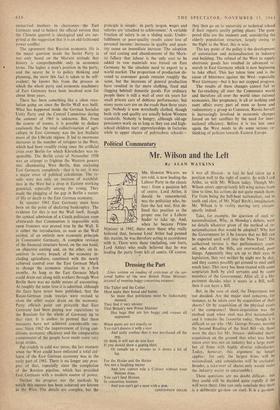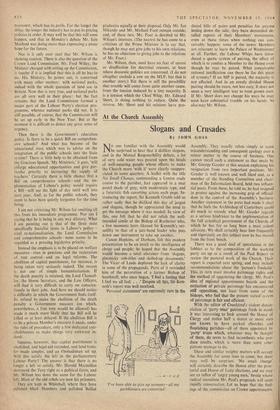Political Commentary
Mr. Wilson and the Left
By ALAN WATKINS
Dressing the Part
Lines written on reading of criticisms of the sar- torial habits of the new British Prime Minister, accused of wearing baggy concertina trousers.
The Tailor and the Cutter Must make their bread and butter,
So insist that politicians must be fashionably
dressed, They find it very sinister That Britain's new Prime Minister Has bags that arc too baggy and creases all unpressed.
When pants are not exactly so
You can't dismiss it with a mot
And airily confess that it was purchased off the peg, Or think it will not do you hurt It you should show a gaping shirt, Or rumple up a trouser so it shows a bit of leg.
For the Hosier and the Hatter Are not a laughing matter
And you cannot rule a Cabinet without your
buttons done.
You can't lead Houses In concertina trousies
And you can't get a man with a pun.
CHRISTOPIIER HOLLIS
it was all illusion : in fact he had taken up a position well to the right of centre. 4s with Lord Attlee, so with Mr. Wilson today. Though Mr. Wilson utters appropriately left-wing noises from time to time, his actions do not quite match them. Far from being the hell-bent nationaliscr, red in tooth and claw, of Mr. Nigel Birch's imagination, Mr. Wilson is in reality moving very circum- spectly indeed.
Take, for example, the question of steel re- nationalisation. Why, in Monday's debate, were no details whatever given of the method of re- nationalisation that would be adopted? Why has the Government let it be known that no Bill can be expected until well into the New Year? The authorised version is that parliamentary coun- sel, who draft the Bills, are overworked, poor things. Apparently they are up to their eyes in legislation, they rest neither by night nor by day, and they cannot possibly get around to steel until much later. This story has been treated with some scepticism both by civil servants and by some members of the Government. After all, if a De- partment decides what it wants in a Bill, well, then it can have a Bill.
But, in the case of steel, the Department has 'not decided. Are the major steel concerns, for instance, to be taken over by acquisition of their shares? Or by acquisition of the physical assets of the conipanies? Share-acquisition was the method used when steel was .first nationalised, and it remains the favourite today, though it is difficult to see why. (Mr. George Strauss, moving the Second Reading of the Steel Bill —ah, those were the days for Mr. Strauss2-L-defendecl share acquisition on the ground that what was being taken over was not an industry but a large num- ber of firms with highly diverse subsidiaries. Today, however, this argument no longer applies: for only the largest firms will be nationalised, and subsidiaries will be excluded. Besides, a take-over of shares only would make the industry easier to unscramble.) These questions are no doubt difficult: bill they could still be decided quite rapidly if the will were there. One can only conclude that there is a deliberate go-slow on steel. It is a go-sloW, moreover, which has its perils. For the longer the delay, the longer the industry has to put its pricing policies in order. It may well be that this will soon happen, and that in Monday's debate Mr. lain Macleod was doing more than expressing a pious hope for the fUture.
Nor is it only over steel that Mr. Wilson is showing caution. There is also the question of the Crown Land Commission. Mr. Fred Willey, the Minister charged with setting up the Commission, is touchy if it is implied that this is all he has to do. His Ministry, he points out, is concerned with many other matters: with national parks, indeed with the whole question of land use in Britain. Now this is very true, and national parks are all very well in their place: but the fact remains that the Land Commission formed a major part of the Labour Party's election pro- gramme, whereas national parks did not. It is still possible, of course, that the Commission will be set up early in the New Year. But at the moment it is difficult to detect any great sense of urgency.
Then there is the Government's education policy. Is there to be a quick Bill on cbmprehen- sive schools? And what has become of the 'educational trust which was to advise on the integration of the public schools into the State system? There is little help to be obtained from the Gracious Speech. 'My Ministers,' it goes, 'will enlarge educational opportunities and give par- ticular priority to increasing the supply Of teachers.' Certainly there is little chance that a Bill on comprehensive schools—and the im- plementation of Labour's policy would require a. Bill—will see the light of day until well into next year. And, as for the public schools, they seem to have been quietly forgotten for the time being.
am not criticising Mr. Wilson for omitting all this from his immediate programme. Nor am I saying that he is being in any way dilatory. What I am pointing out is that of the three most specifically Socialist items in Labour's policy— steel re-nationalisation, the Land Commission and comprehensive schools—none seems to be regarded as a pressing legislative priority.
Instead the emphasis is to be placed on welfare measures—rises in pensions and the restoration of rent control—and on legal reforms. The abolition of capital punishment, for instance, is being taken very seriously indeed. The reason is not one • of simple humanitarianism. If the death penalty is retained, the Lord Chancel- lor, the Home Secretary, and the Law Officers, will find it very difficult to carry on conscien- tiously in their jobs. And here we should notice a difficulty in which the Government finds itself. Its refusal to make the abolition of the death penalty a Government measure (on which, nevertheless, a free vote would be allowed) has made it much more likely that the Bill will be killed or at least delayed. If the abolition Bill is to be a private Member's measure it needs, under the rules of procedure, only a few dedicated anti- abolitionists to make things very awkward in- deed: Suppose, however, that capital punishment is abolished, and legal aid extended, and land trans- fer made simpler, and an Ombudsman set up. Will this satisfy the left in the parliamentary Labour Party? The answer is that there is no longer a left to satisfy. Mr. Harold Macmillan destroyed the Tory right as a political force, and Mr. Wilson has done the same for the Labour left. Most of the old rebels are now his prisoners.
They are kept in Whitehall, where they have polished black Humbers and polished Balliol
graduates equally at their disposal. Only Mr. Ian Mikardo and Mr. Michael Foot remain outside; and, of these two, Mr. Foot is devoted to Mr. Wilson's interests. (The nearest he has come to a criticism of the Prime Minister is to say that, though he may not give jobs to his own relations, he has no objection to giving jobs to the relations of Mr. Foot.) Mr. Wilson, then, need have no fear of unrest or disaffection for doctrinal reasons, at least where domestic politics are concerned. (I do not altogther exclude a row on the MLF, but that is another story.) Yet there is still the possibility that trouble will come from quite another cause, from the tension induced by a tiny majority. It is a tension which the Chief Whip, Mr. Edward Short, is doing nothing to reduce. Quite the reverse. Mr. Short and his minions have pro-
duced bills of pains and penalties for anyone letting down the side; they have demanded de- tailed reports of their Members' movements, even at those times when nothing can con- ceivably happen; some of the newer Members are reluctant to leave the Palace of Westminster at all. Further, the Labour Whips have intro- duced a quota system of pairing, the effect of which is to confine a Member to the House even though he may be paired. What conceivable rational justification can there be for this piece of tyranny? If an MP is paired, the majority is not affected. And in an evenly divided House pairing should be more, not less easy. It does not • seem a very intelligent way to treat grown men. If Mr. Short does not change his ways he may soon have substantial trouble on his hands. So also may Mr. Wilson.











































 Previous page
Previous page